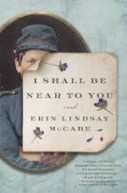Two Civil War Novels: I Shall Be Near to You and Neverhome
Erin Lindsay McCabe and Laird Hunt each envision the American Civil War from a female’s perspective, sending women soldiers into battle in two unforgettable novels. McCabe turns Rosetta Wakefield into Ross Stone; Hunt turns Constance Thompson into Gallant Ash; both Ross and Ash then participate in some of the bloodiest battles encountered by the union troops. Several hundred women probably did fight in the Civil War. Concealing their gender, they followed husbands, brothers, fathers, friends, and their own senses of destiny into the bloody conflict. So neither of these novels is outside the realm of possibility, nether worlds of combat portrayed in haunting and evocative words.
 I Shall Be Near to You tells what happens to a pair of newlyweds when they become members of New York’s Company 97. Two weeks after their wedding—a rushed affair because the groom has just enlisted—Jeremiah leaves. His absence makes his bride miserable, so she opts to join the army, too. A determined young woman, Rosetta persuades Jeremiah and several other men from home to keep quiet about her charade. I Shall Be Near to You then follows the logical illogical progression of war. Far from the front at first, the Company marches and drills and bellyaches. When they draw closer to the battlegrounds, however, the scenery grows more hellish. In fact, McCabe explicitly describes the landscape of war, the fact that this particular war was fought on farmsteads among growing crops and livestock. Her first glimpse of the enemy startles Rosetta. “They look like any farmer from home and except for the gray they’re wearing it is almost like we are coming out of the trees to kill ourselves, coming for our hill, flanking our own rifles.”
I Shall Be Near to You tells what happens to a pair of newlyweds when they become members of New York’s Company 97. Two weeks after their wedding—a rushed affair because the groom has just enlisted—Jeremiah leaves. His absence makes his bride miserable, so she opts to join the army, too. A determined young woman, Rosetta persuades Jeremiah and several other men from home to keep quiet about her charade. I Shall Be Near to You then follows the logical illogical progression of war. Far from the front at first, the Company marches and drills and bellyaches. When they draw closer to the battlegrounds, however, the scenery grows more hellish. In fact, McCabe explicitly describes the landscape of war, the fact that this particular war was fought on farmsteads among growing crops and livestock. Her first glimpse of the enemy startles Rosetta. “They look like any farmer from home and except for the gray they’re wearing it is almost like we are coming out of the trees to kill ourselves, coming for our hill, flanking our own rifles.”

Neverhome’s heroic Ash has a similar reaction. “It was their boys in their slouch hats and us in ours. If we’d been wearing the same colors, you could have thought it was a mirror. Like the central job of it was we were fixing to fire at ourselves. Like the other half of it, the mirror, was fixing to fire straight back.” Constance, a sturdy forthright woman, leaves her husband behind to tend the family farm in Indiana. Healthier than Bartholomew, and a crack shot with a rifle, she changes her name and determines that she will do her duty and go war. Like Rosetta, and like most of the men who joined the army in those days, Ash has no idea of the inferno she will be facing. Neverhome is as graphic as I Shall Be Near to You, but in a way that seems to me more psychologically damning. Both novels vividly depict the slaughter, but Nevermore includes tormenting dreams as well. Both novels also travel with their protagonists away from battle and picture them re-assuming their roles as women. Nevermore’s aftermath is more extensive, however, and more redolent with nightmares and hallucinations.
Both McCabe and Hunt chose to narrate their stories through the vernacular voices of their lead characters. In neither case do the colloquialisms sound forced. Such a controlling point of view allows McCabe to explore many facets of gender, as well as many aspects of violence. Hunt is less focused on gender issues and more intrigued by the psychological degradation that accompanies war and the aftermath of war. Many American Civil War books detail the senseless violence of combat, the ensuing death and destruction of so many participants, and the trauma of what happens when the shooting stops. I Shall Be Near to You and Neverhome do so with female finesse and power. McCabe’s novel is excellent, a thorough indictment of the war while at the same time a compelling story of love and commitment. Hunt’s novel is equally strong, a chilling assessment of what we today would call post-traumatic stress disorder, as filtered through a woman’s mind and spirit. I highly recommend both of these books that add stunning new dimensions to a gendered vision of the nineteenth century. – Ann Ronald
Also available by Laird Hunt: Office at Night; Kind One; The Impossibilities; The Paris Stories; Ray of the Star; The Exquisite.









